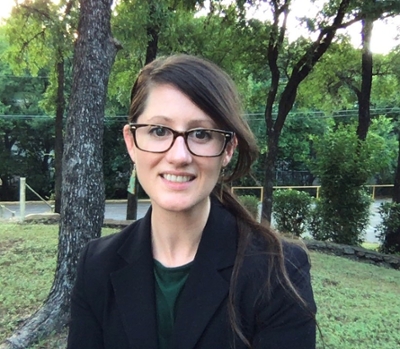
Lily Jackson Joins School of Energy Resources Research Team
Published December 05, 2022
By Christine Reed

The School of Energy Resources (SER) is pleased to welcome Dr. Lily Jackson to the research team in the Center for Economic Geology Research (CEGR).
A geoscientist, Jackson brings with her vast experience and expertise to help contend with the geologic queries associated with the major research projects at play in the center.
Jackson will primarily be working on the rare earth element (REE) and critical mineral (CM) projects in CEGR as an assistant research scientist with an emphasis on regional geology. In particular, she will be working to advance the resource assessment and outreach efforts for the Carbon Ore, Rare Earth and Critical Mineral (CORE-CM) projects in both the Powder River Basin (PRB), and the Greater Green River and Wind River Basins (GGRB).
In her position, Jackson will conduct sample collection, geochemical analysis, and geologic modeling of REE and CM deposits in the target coal basins.
“I am looking forward to filling some of the gaps in these projects to paint a complete picture of the REE and CM resources in these coal basins,” says Jackson. “Through extensive sampling we will know how prevalent and rich the REE distributions are in the basin. From there, using existing subsurface data, we will map the extent of the deposits based on the samples we collected to develop a functional model of the entire area.”
Originally from northern Arizona, Jackson attended the University of Arizona for her bachelor’s degree in Geosciences. She then attended the University of Texas at Austin in the Jackson School of Geosciences for her Ph.D. in Geological Sciences before entering the private sector. She worked for the Norwegian oil company, Equinor, in their onshore unconventional operations and exploration team. During her time with the company, she was involved in the drilling of over twenty new unconventional oil and gas wells.
Jackson then came to the University of Wyoming as a postdoctoral researcher in the department of Geology and Geophysics where she worked on an REE research project in Ecuador. By examining the tectonic and magmatic history of the area, Jackson measured the REE abundances in the mineral zircon, which is common in the crustal rocks, to understand the likelihood of REE deposits and the historic relevance in the development of the formations.
With expertise in sedimentology, tectonics, and geochronology, Jackson is also an accomplished writer and has published extensively on the topics. She has contributed to, or led over two dozen publications in prominent scientific journals, and her work has been increasingly cited. She currently serves an associate editor for the London-based publication, Geological Magazine.
In addition to her hard sciences background, Jackson nurtures an interest at the intersection of geology and public policy. She has been involved with the geoscience community for many years and is actively involved in the Geological Society of America (GSA). She is a member of, and has previously chaired the Geology and Public Policy committee, and is the current chair of the Geology and Society division for the GSA.
“We could not ask for a more qualified person to help lead some of the rare earth and critical mineral research at SER,” says CEGR Project Manager Erin Phillips. “Lily is unbelievably skilled and knowledgeable in her field, and her ability to help bridge the gap with the policy side of the research will be instrumental in interfacing with decision makers across the REE supply chain on these projects.”
Jackson was drawn to the position at SER because of the pioneering research being conducted to address some of these issues in REE and CM, as well as new technologies under development in carbon capture, utilization and storage, as well as hydrogen production, transportation and storage.
“I am excited to be working at SER because I have the opportunity to work on what I consider to be the most important research issues to modern society,” says Jackson. “With a growing human population globally, a growing demand for energy, and concerns about climate issues, it is important for the US and the world to broaden their energy portfolios and this is work that is directly contributing to that diversification.” She adds, “over the course of my career I have been hearing about these issues and I am excited that geosciences are featured so prominently. I feel I have an important role to play in the narrative and I look forward to working at the forefront.”
